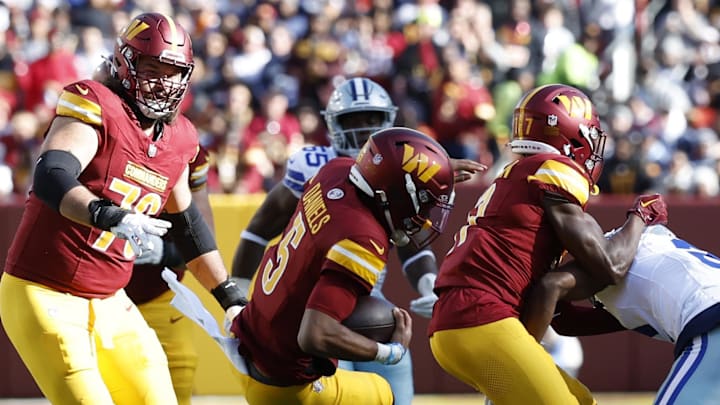The Washington Commanders lost a rollercoaster game to the Dallas Cowboys in part because of a faulty kick operation that resulted in Austin Seibert missing a game-tying extra point in the final minute. But that is not the primary reason they were undone.
They lost in part because they could not contain kick returner extraordinaire KaVontae Turpin, who we noted before the game is the most dangerous player the Cowboys currently have. But that is not the main reason they lost.
They lost in part because they made far too many mistakes. They missed two extra points. They allowed two kickoff returns for touchdowns. The Commanders committed eight penalties to Dallas’ four and turned the ball over three times to the Cowboys' one.
And yet, none of those mistakes explain why the Commanders dropped a game they desperately needed to win, at home, against a team that had lost five straight.
Commanders offense was bullied in the trenches vs. the Cowboys
The primary reason that the Commanders lost to the Cowboys is because they were physically dominated by a Dallas defense that entered the game among the worst in the league in most important statistical categories.
The explosion of offense in the final quarter made Washington’s numbers for the game look respectable. But make no mistake, when Washington was in a position to seize control of the game in the first half, the unit failed to do so.
By the time they began to make plays, it proved too little, too late.
Consider the following plays:
On Washington’s first play from scrimmage, Cowboys defensive tackle Mazi Smith manhandled his former teammate Tyler Biadasz. It resulted in Commanders’ running back Brian Robinson Jr. sustaining an injury that would severely limit him throughout the game.
On Washington’s second play, right tackle Andrew Wylie missed a blitz pickup that forced an incomplete pass from Jayden Daniels.
After a successful Daniels run, the entire line failed to move the Cowboys defensive front, resulting in a short Austin Ekeler run. The veteran ran a sweep on the following play. Pulling left tackle Brandon Coleman did not block anyone and the backfield threat was stopped for no gain by cornerback Jourdan Lewis.
On the first play of the second quarter, with Washington in Dallas territory after recovering a fumble, Cowboys All-Pro edge rusher Micah Parsons ran right past Washinton’s right guard Sam Cosmi and forced another incompletion.
Then, on the first play after Washington had blocked a Cowboys’ punt and again had the ball in Dallas territory, left guard Nick Allegretti failed to sustain his block on tackle Osa Odighizuwa. Robinson was stuffed for no gain.
Two plays later, Cosmi was late getting out on a screen pass. This allowed Cowboys defensive end Chauncey Golston to rip the ball out of Robinson’s hands for an interception.
That’s seven key first-half plays on which Washington’s offensive line was beaten - physically, mentally, or both. The Commanders began three first-half drives in Dallas territory, and two others on their own 32 and 42. With all that sensational field position, they scored three points.
That is why the Commanders lost.
This game should have been out of reach by halftime. In the first half, Washington’s offense totaled 113 yards. They averaged a paltry 3.8 yards per play.
The Commanders were even worse at passing the ball, averaging just 2.9 yards per attempt. They allowed three sacks and three tackles for loss. Dallas blitzed often and Daniels was running for his life.
In the last two weeks - losses to the Pittsburgh Steelers and Philadelphia Eagles - the Commanders' offensive line did not play well. That can be explained by the fact that both Pennsylvania squads have outstanding front sevens on defense. That is not the case with the Cowboys.
Outside of Parsons, the Cowboys do not boast elite talent across their defensive front. Yet they still controlled the game.
There are other culprits in the loss. Washington’s play-calling and offensive rhythm seemed oddly drab. The defense followed a stretch of good plays with some blown assignments or undisciplined penalties. They never generated much pass pressure on Cooper Rush and Jeremy Chinn was exposed in coverage.
All of that contributed to the loss. But in the end, Washington was simply physically dominated in the trenches on offense.
Some inspired play late made the final numbers look pretty good. But when the game was asking to be won in the first half, the Commanders' offense, and primarily the offensive line, was simply not up to the task.
